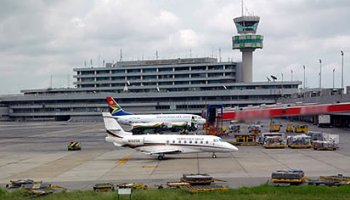Nigeria’s aviation sector is edging dangerously close to collapse as airlines battle a crushing load of taxes, fees, and forex pressures. Industry leaders say the government’s aggressive taxation framework has pushed carriers into severe financial distress. Without urgent reform, they warn the market may lose more airlines.
Obiora Okonkwo, Chairman of United Nigeria Airlines, raised the alarm in a recent industry address. He said local carriers now pay nearly 20 different charges tied to each ticket, draining already thin margins and forcing airlines to increase fares beyond what most Nigerians can afford. He argued that no industry can thrive under such financial suffocation.
Okonkwo urged the government to streamline aviation taxes and offer airlines loans at single-digit interest rates. He noted that high taxes combine with volatile foreign-exchange rates to create a near-impossible operating environment. Airlines must pay for aircraft maintenance, spare parts, and training in dollars, yet they earn in naira. The widening exchange gap, he said, pushes operating costs to levels “that simply cannot sustain an airline.”
His concerns reflect a growing frustration across the industry.
Aero Contractors’ Managing Director, Capt. Ado Sanusi, reinforced the warning. He said multiple taxation remains a major threat to the survival of Nigerian airlines and insisted the government must act now. Sanusi argued that if authorities reduce taxes and charges, airlines would cut fares, stimulate demand, and recover lost revenue. Without this reform, he said, more carriers will fail.
ALSO WATCH MARKETING EDGE ONTV
These warnings are not isolated. Aviation reports rank Nigeria as one of the most expensive countries in Africa for aviation taxes and fees. According to the International Air Transport Association (IATA), Nigeria’s departure taxes sit among the top three highest on the continent. This cost structure trickles down to passengers, making domestic flights unaffordable for millions.
Experts say the consequences of this tax overload are clear. High charges inflate ticket prices, weaken demand, and force airlines to operate half-empty flights. Operating below capacity erodes profitability and threatens long-term viability. The sector has already witnessed repeated airline shutdowns over the years as operators collapse under financial pressure.
Industry analysts warn that unless the government urgently revises its taxation framework, the aviation sector could lose more carriers. This would reduce competition, drive up fares further, weaken connectivity, and ultimately damage the broader economy.
Aviation operators are calling for a total review of the tax regime. They want consolidated charges, transparent regulation, improved forex access, and financing that recognises the strategic importance of aviation to national development.
For now, the message from airline leaders is blunt: remove the excessive taxes or risk the collapse of Nigeria’s aviation industry.






Comment
No comments found.